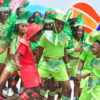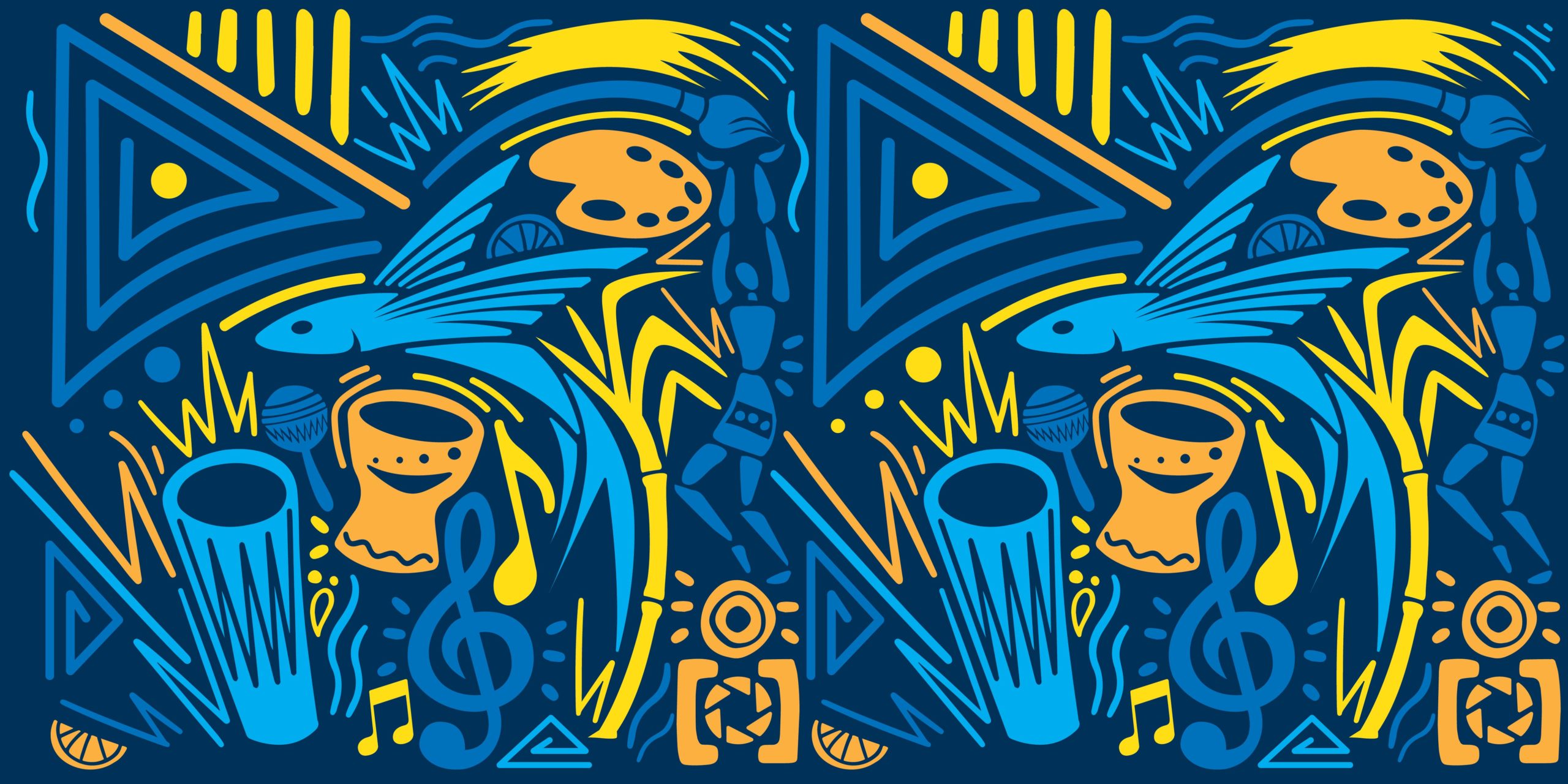
NATIONAL INDEPENDENCE FESTIVAL OF CREATIVE ARTS (NIFCA) PERFORMING ARTS – DANCE RULES 2023
NON-PROFESSIONAL AND JUNIOR CATEGORIES
1. NAME OF THE COMPETITION
- The name of the competition shall be the NIFCA Performing Arts Dance –Non-Professional Adult and Junior (the Competition) which comprises Preliminaries and Finals organized and administered by the National Cultural Foundation (NCF).
- These Rules apply to those persons wishing to enter the Competition.
2. ELIGIBILITY
- Persons wishing to enter the Competition must be:
- A citizen of Barbados or
- Legally resident in Barbados
- If the artiste is not a citizen or legal resident of Barbados, he/she must
present evidence to show he/she is actively pursuing legal residence.
- All participants in the national competition must be at least 4 years old by September 1, 2023.
d) Entrants are eligible to participate in the Junior Category of NIFCA Dance where the ages of participants in any entry are in the 4-12 years old or 13-17 years old categories by September 1, 2023. Please note that in the instance of a combination of age classifications, the majority (which must be no less than 80% of the group entry will determine the category of entry. The NCF reserves the right to satisfy itself that the conditions relating to age and criteria are met. In the case of a duet the entry will be taken based on the age of the oldest participant.
e) All persons entering this category must be considered amateur (i.e. they do not make a living from theatre performance ).
f) Please note that in the Non-Professional Adult and Junior categories, in an instance of a combination of age classifications, the majority (which must be no less than 80% of the group entry will determine the category of entry. The NCF reserves the right to satisfy itself that the conditions relating to age and criteria are met.
- The following are eligible to participate in the Competition:
- Individuals
- Schools (Primary, Secondary, Tertiary)
- Community (individual, Groups)
- Performance Training Schools
- Dance Companies, Groups, Troupes
- Other
- Participants should note that NIFCA Performances will be held on weekdays and also Fridays, Saturdays and Sundays. Registration in the competition therefore indicates your availability to perform on these days.
3. ENTRY TO THE COMPETITION
- Persons must enter directly with the NCF by properly filling out the relevant online registration form and submit it to the NCF on or before Wednesday October 4th 2023 accordingly:
– by or before 4:00 p.m. via the NCF website: www.ncf.bb,
The deadline for the receipt of Schools Entry Forms is 4.00 p.m. Friday October 6th 2023.
– Persons requiring assistance with online registration may do so by appointment at the NCF during the week of September 25-29th
No entries will be accepted after these closing dates.
- Participants whose Entries have not been received by the NCF by the deadline indicated at 3a) above shall not be eligible for participation in the Competition.
- The NCF shall dispatch a notice by letter or email to the participant within seven (7) working days of receipt of his/her request for entry advising him/her the request for entry has been approved or refused.
- A participant’s duly appointed representative may register, as set out in 3 (a) above, on behalf of the participant.
- All group entries must be submitted by the designated leader of the group. The group leader’s contact information must be indicated on the registration form. The NCF will address all correspondence about the competition to the designated group leader.
- Participants under 18 years of age at September 1st 2023 must have their entry forms submitted by a teacher, parent or guardian.
- A dance work entered in the Competition must be original and must not have been entered in any previous NCF-organized competition in Barbados. Where there is a complaint that a presentation does not conform to this requirement, the complainant shall produce recorded evidence to support the complaint.
- The penalty for violation of Rule 3 (g) shall be disqualification of the work from the Competition. In addition, the Choreographer/s will be barred from entering the NIFCA Dance Competition within the next two (2) consecutive years. Any choreographer in the Adult Category found to have entered plagiarised works more than once will be banned for life from the competition. Junior choreographers found to have breached this rule more than once will be banned until they reach the age of maturity or for three (3) years, whichever period is longer.
- In the event that work has been rewarded and is subsequently found to have been plagiarized, the reward will be rescinded and any monetary awards must be refunded by the participant.
- The names, ages, national status and dance experience of ALL performers must be indicated at registration. Failure to disclose this pertinent information may affect eligibility of this group to participate.
- Participants should indicate on their registration forms whether there are any social, religious or other arrangements that will affect their scheduling of their adjudications on any specific day(s) of the week.
- All entrants are mandated to attend an orientation exercise as advised by the Coordinating Officer, before the start of Preliminaries.
4. ARBITRATION
- Prior to the deadline for registration, the NCF shall appoint an Arbiter
to decide and adjudicate on any appeals, complaints and matters in dispute or requiring clarification arising from these Rules.
- All complaints related to the Competition shall be submitted, in writing,
to the Arbiter in a sealed envelope addressed as follows:
The Arbiter
National Cultural Foundation
West Terrace
St. James
c) All decisions made by the Arbiter shall be final and binding on the competitors and the NCF.
5. ADJUDICATION
- *NEW* – Prior to the preliminary adjudication, there will be mandatory coaching for all entrants to the competition towards guiding the entrant to their best possible presentation. These sessions will be for a maximum of one hour per entrant.
- The Competition shall be judged in two (2) stages – Preliminaries and Finals.
- The NCF shall appoint a Chief Judge who shall adjudicate at each stage of the Competition.
- The NCF shall determine the composition of the judging panel at each of the Competition.
- The names of the judges shall be publicly announced before the commencement of the Preliminaries.
- The judges reserve the right not to award any special prizes offered in this competition.
6. PRELIMINARIES
- Judging at the Preliminaries shall not be open to the public.
- Only entries received by the closing date indicated at Rule 3 c) above shall be eligible to be judged in the Preliminaries.
- Each participant (individual or group) shall enter and perform no more than two (2) works in each genre of dance at the Preliminaries.
- Participants performing to recorded music or their duly appointed representatives shall present a recording (as outlined in 10 (z) & 10 (aa) to the NCF designated officer no later than forty-eight (48) hours prior to the commencement of the Preliminaries. Failure to provide this may result in the performance being compromised.
- At the Preliminaries, the maximum points awarded to each participant by the judging panel shall be as follows:
Presentation 15
Choreography 35
Execution 35
Creativity 15
Total 100
- An average score for each work entered shall be taken and the top twenty-six participants scoring over seventy (70) points in the non-professional category or sixty-five (65) points for the Junior Category of NIFCA Dance shall be selected to perform those works at the Dance Finals.
- In the event of a tie for twenty-sixth place, all Preliminary participants who are tied for twenty-sixth place shall be invited to compete at the Dance Finals.
- At the request of participants, judges will critique their performances at the Preliminaries only. Participants must indicate on the registration form their desire to have this critique done.
- If at the Preliminaries stage, the Dance Panel assesses an entry to be more suited for another category of participation (such as Mixed Discipline, Theatre or Music) it will be, with the written approval of the participant, transferred and assessed by the relevant Panel accordingly.
- *NEW* Any first time entry to NIFCA performing arts that does not qualify for advancement in the Preliminary stage, may be re-entered in the following year.
7. FINALS
- Participants selected for the Dance Finals shall perform only those works that have been selected by the judging panel.
- Participants shall assemble at the venue designated by the NCF on a date and time advised by the NCF to rehearse for participation at the Finals.
- At the Finals, the maximum points awarded to each participant by the judging panel shall be as follows:
Presentation 20
Choreography 30
Execution 40
Creativity 10
Total 100
- An average score for each piece entered shall be taken. Participants who perform dance works that are awarded average scores as indicated below will be awarded certificates as follows:
Non-Professional Senior Category
Gold 91 – 100 points
Silver 81 – 90 points
Bronze 70 – 80 points
Junior Category
Gold 86 – 100 points
Silver 76 – 85 points
Bronze 65 – 75 points
- No duplicate certificates will be issued for any lost/stolen certificates. However, a letter confirming the award will be issued by the NCF if requested to do so.
9. GENERAL AND SPECIAL AWARDS
- Participants who receive certificates are eligible for Incentive, General and Special Top awards as outlined in Appendix “A”.
10. GENERAL REGULATIONS
Conduct
- A participant shall be held accountable for the actions of those individuals whom he or she brings on stage during the Competition.
- If, during the Competition period, a participant or any of his/her supporting acts makes any gesture or action that exceeds the bounds of good taste, the participant may be disqualified from the Competition. The Judges shall determine whether behaviour is indecent, obscene, and defamatory or in excess of the bounds of good taste.
- Participants or their associates who behave in a disruptive manner, which interferes with the performance of other individuals or groups or the smooth running of the Competition, may be disqualified from further participation in the Competition.
Venues
- The NCF will choose the venue for the staging of the Preliminaries, and Finals components of this competition.
- Participants shall report to the NCF Stage Manager or NCF designated Officer at the venues selected for the staging of the Preliminaries, and Finals no later than one (1) hour before the scheduled start time of the event.
- Failure to comply with Rule 10 (e) may result in the reduction of one (1) point by each judge up to a maximum of five (5) points.
Staging
- The manner of presentation of the work will be at the discretion of the participant. Each participant is, however, limited to a maximum of 30 performers for dance, however, a maximum of twenty (20) persons are allowed on stage at any one time during the presentation of the work.
- Should a participant fail to observe Rule 10 (g) a designated NCF officer shall inform the Chief Judge immediately after the participant’s performance has ended.
- The penalty for violating Rule 10 (g) shall be a deduction of one (1) point by each judge for every person in excess of the number permitted, up to a maximum of five (5) points per judge on the panel. The designated NCF officer shall notify the participant or the participant’s duly appointed representative of the violation.
- Performance in the Competition shall not exceed ten (10) minutes for group presentations and five (5) minutes for solo presentations and will be timed by the official time-keeper from the start of the performance (first musical note played and/or first movement on stage).
- A violation of Rule 10 (j) shall result in a one (1) point deduction by each judge on the panel for every minute or part thereof over the limit up to a maximum of five (5) points per judge. Where a violation occurs, the designated NCF officer shall notify the participant or the participant’s duly appointed representative of the violation.
- Each participant shall appear and perform in his/her correct position as determined and notified by the NCF.
- A violation of Rule 10 (l) may result in a one (1) point deduction by each judge on the panel up to a maximum of five (5) points.
- Failure by any participant to comply with the reasonable instructions of the NCF designated officer may result in his/her disqualification from the Competition.
- The use of props and costumes will be a consideration for awarding points at the Finals.
- Choreographies may be performed in any of the categories listed in Appendix “B”. Fusions within a category or across different categories are allowed. Participants must indicate clearly which category/categories are being fused.
- All participants shall be responsible for the setting up, dismantling, transportation and safety of their equipment which must be removed promptly at the end of the respective judging session.
- All participants must provide their own sets, costumes, props, make-up, accompaniment and instruments.
- The NCF will provide technical assistance in stage management, sound and lighting for the Finals only.
- Participants shall provide the NCF’s designated officer with a list of their technical requirements (lighting, position of props etc.) for the Finals no later than forty-eight (48) working hours after being notified of their selection to perform at the Finals. Failure to provide this information may result in the performance being compromised.
- All children shall be accompanied by adults at the minimum ratio of one (1) adult to ten (10) children at all stages of the Competition.
- A maximum of two (2) assistants shall be allowed to accompany each adult group at all stages of the Competition.
Musical Accompaniment
- Participants using live music shall provide their own accompaniment and shall indicate at registration what instruments will be used, the number of persons, the number of chairs and the number of microphones required.
- Participants not submitting the information required in Rule 10 (w) shall not be considered for participation in the Competition.
- The participant shall submit a copy of the props list, a short biography and details of the music to be used, to the NCF on the entry form. The details of the music to be used, whether live or recorded, must include the title of the music, the performer and composer and the length of the music.
- All recorded music must be presented via email and on a flash drive in MP3/MP4 format, clearly labelled showing the name of the participant, the title of music contained thereon, the name of the composer(s) and the name of the person that mixed the music.
- Each piece of music must be submitted on a separate flash drive. Participants shall have an extra copy of the flash drive as a backup in the event of an accident. Flash Drives must be clearly labelled with the name of participant and title of the piece.
Release of Scores
- The average scores of the participants for the Finals shall be made public via the NCF website within seven (7) days after the completion of the NIFCA Competition.
Special Performances
- Award-winning participants in the Competition may be required to perform at another NIFCA event. Entry in the Competition, therefore, implies an acceptance to perform at the assigned event if chosen.
11. REHEARSALS
- Participants who enter the competition can apply to the NCF for rehearsal space in the NCF Dance Studio from October 2023. Participants should contact the Cultural Officer – Dance no less than fourteen days before the space is required.
- Participants who progress to the Finals levels of the competition will be scheduled for one rehearsal on the relevant stage. Where additional space is needed, the participant is responsible for making their own arrangements.
12. PROMOTION / BROADCAST OF PERFORMANCE
- The participant agrees that the NCF shall be entitled to use his/her performance or part thereof or his/her image or likeness in the promotion of the competition and other related NIFCA events.
- The NCF shall have the following rights in the performance:
- The right to a live broadcast, within Barbados, of the whole or any substantial part of the performance;
- The right to use excerpts of the performance for promotional or marketing purposes within Barbados and outside of Barbados;
- The right to copy the performance or a recording of the performance for the purposes of teaching, research, news reporting, review, instruction or education
- The right to record the performance for archival purposes;
- The right to include the performance in any Pay Per View or subscription programming provided there is an agreement between the producer and any performing rights organization of which the Performer may be a member;
- The right to include the performance in any Pay Per View or subscription programming for the agreed upon rate of two hundred and fifty Barbados Dollars (Bds. $250.00) between the producer and the performer if the performer is not a member any performing rights organization.
APPENDIX “A”
NATIONAL INDEPENDENCE FESTIVAL OF CREATIVE ARTS (NIFCA)
SPECIAL AND GENERAL AWARDS FOR DANCE –NON-PROFESSIONAL ADULT & JUNIORS
SPECIAL TOP AWARDS
- The Prime Minister’s Scholarship is sponsored by the Prime Minister’s Office.
An individual and/or creator of an entry achieving GOLD (an average score of 91% or higher in the Dance Finals) may be nominated for this prize. Awardees
must be between the ages of 17 – 40 and demonstrate the greatest potential for training and development in their discipline. This award which may only be won once by any participant is for a maximum of BDS$35 000.00, for tertiary studies in the awarded discipline at any Caribbean Arts institution. Only one participant may be nominated for this by the judges in each of the disciplines of NIFCA. A maximum of two scholarships will be awarded in any year.
- The Richild Springer Award of Excellence takes the form of a scholarship valued at $10,000.00 and a trophy. Entrants must complete a Choreographer’s workshop component in order to be eligible for this prize which will take the form of a summer scholarship/ study attachment to a professional school or company overseas. The prize may be awarded to the most outstanding choreographer at NIFCA.
- The Madame Ifill Award of Excellence is in the form of a cash prize of
$3,000.00 and a trophy. It may be awarded to the highest scoring Non-Professional achieving a score of 93% or greater in NIFCA Dance Finals. It will only be awarded should the judges determine that the entry merits the award.
- *NEW* The Gene Carson Award of Excellence – is in the form of a cash prize of $3,000.00 and a trophy or the highest scoring Junior entry achieving a score of 91% or greater in NIFCA Dance Finals. It will only be awarded should the judges determine that the entry merits the award.
- The Prime Minister’s Award for the Best Original NIFCA Dance Entry. This award is offered to recognize significant creativity and innovation in a NIFCA entry that challenges established norms in the art-form. It will comprise a cash award of $3,500.00 and a trophy. Only one participant achieving an average score of 91% or higher at the Finals stage may be nominated for this by the Dance judges. There will be only one given in any year.
- 4 scholarships to the Barbados Community College will be offered towards training in the Associate Degree programme in Dance to a value of Bds. $3000.00 each. Scholarship Winners must be 16 years and over.
- *NEW* 2 scholarships to the TVET Council will be offered towards training in the NVQ Dance Choreography to the value of Bds. $2500.00 each. Scholarship winners must be 16 years and over.
- *NEW* 50th Anniversary of NIFCA Award – this prize will be awarded to the Most Outstanding Presentation in the NIFCA Dance 2023. The prize will take the form of a Trophy and a cash prize of $2000.00.
- The Founder’s Trophy. This award is in memory of NIFCA Founder – Mr. Arden
Clark. It is in the form of a challenge trophy which is awarded to the most outstanding performance achieving an average score of 91% or higher in the NIFCA Performing Arts Finals.
GENERAL & INCENTIVE AWARDS
- All entries that medal at the Finals of the Dance competition will be eligible for these awards as follows:
Incentive Awards will be offered to reward and encourage promising acts. These will take the form of a plaque and cash awards to the value of Four hundred dollars ($400.00) for an individual and Seven Hundred and Fifty dollars ($750.00) for a group as follows:
Best presentation by an Individual
Best performance by a Primary
Best performance by a Secondary School
*NEW* Best Intangible Cultural Heritage (ICH) Performance
Best presentation by a Group
Best performance by a Community Group
Best Newcomer to NIFCA Dance
- The Cynthia Wilson NIFCA Producer’s Prize. This prize which takes the form of a trophy, will be awarded to recognize outstanding participation by a community leader, producer/organizer who facilitates and manages the successful participation of a group of artistes in any discipline for over five years. One prize will be awarded each year.
- Incentive Award for outstanding participation by an Artiste(s) with Disabilities. This award comprises of a trophy and a cash award to a value of $400.00 for an individual and $750.00 for a group. To qualify, participants must specify on their entry form their wish to be considered for this award.
- In Commemoration of the 160th Anniversary of the Barbados Landship, a cash award of $2000.00 will be offered in each discipline for any entry that effectively illustrates any aspect of this institution’s history, activities or its legacy.
- *NEW*- The Business Entrepreneur Prize. This prize is awarded across the NIFCA disciplines and is valued at $15’000.00. It will be awarded to recognize works that demonstrate entrepreneurial value. This prize will be awarded to a group achieving the Gold award in the 2023 competition towards creation of a marketable product from their body of work.
- Certificates of Achievement. These will be issued to authors/directors/ set-designers/costume-designers/accompanists in recognition of their contribution to award-winning acts. These certificates will bear a gold, silver or bronze seal according to the level of award won by the entry.
APPENDIX “B”
NATIONAL INDEPENDENCE FESTIVAL OF CREATIVE ARTS (NIFCA) GENERAL GUIDELINES – DANCE
DANCE CATEGORIES
African Dance
Dances that carry references traditionally associated with the African continent are often characterized by specific instruments led by the drum and other rhythms, for specific functional purposes (e.g. dances for births, deaths, rites, harvest, and marriage), specific costumes, masquerade and chants. They are dances attributed to particular groups of African peoples.
African dance movement can also function as communication. These dances may utilize symbolic gestures, mime, props, masks, costumes, body painting, and other visual devices. Basic movements may be simple or complex, involving polyrhythmic use of different body parts and intricate actions including rotation, ripples, contraction and release, as well as variations in dynamics, levels, and use of space. The dance may be open to all, or it may be an activity in which one, two, three, or four individuals (regardless of sex) take turns in the dancing ring. Team dances also occur.
Ballet
A highly standardized dance form which demonstrates classical ballet vocabulary, techniques and styles. Whether narrative, lyrical or abstract, there is a special emphasis on line (clarity of the body positions); lightness in the quality of movement; elevation (especially Pointe work for females) and virtuosity (ability to execute tremendous physical feats with apparent ease) more so in the case of the male dancer.
Ballroom and Latin Dance
Any of various social dances in which couples perform set moves. Any number of couples may dance in these settings. Important factors include male/female role-play and interaction, and synchronizing couple’s movement with the music.
Sub-categories include:
Classics: – Waltz – Tango – Quickstep – Viennese Waltz – Foxtrot
Latin American: – Cha-Cha-Cha – Samba – Rhumba – Paso doble – Jive Alternate: – Salsa – Meringue – Mambo – Kizomba – Bachata
Caribbean Dance
Dance movement that is inspired by and references traditions from the Caribbean. These include dance forms that developed in the Caribbean whose routes are traced to traditional African, Amerindian, Asian, and European origins that became indigenous to their present location. Whether celebratory, ceremonial, sensual or spiritual, most are characterized by: strong community spirit, role-play, individual improvisation, and the indivisible partnership between music and dance.
Jazz Dance
This traditionally refers to all dances arising out of jazz music, which has a syncopated beat, for example: the ‘Cakewalk’, ‘Swing’, ‘Lindy Hop’. It is usually recognized for use of isolated sequential body movements, high energy and sensuous dynamic quality. Jazz dance has evolved, and may be divided, but not limited to, certain sub-categories.
- Lyrical Jazz -fluid extended movements that sometimes evoke a sensual quality.
- Funky Jazz – performing polyrhythmic, angular disjointed movements, hip isolations, shoulder shrugs, head rolls. Other aesthetics include timed isolations, finger-snapping, handclapping and walking.
- Musical Theatre Jazz – performed on Broadway or in the cabaret setting. Movements assist in presenting a story through song and dance. Props e.g. canes, hats, chairs etc. maybe used to advance the storyline.
Modern (Contemporary) Dance
Creative use of dance vocabulary used to interpret and communicate an idea with a theme or movement motif. Movement may be sourced from a range of experiences, conditions and activities. The dance may be abstract, narrative, based on variations of an existing movement pattern or inspired by various stimuli, including music, words, sound, nature, emotions and colours among many. Contemporary dance involves experimentation and improvisation, not
only with finding new ways of moving, but also finding new ways to use stimuli to relate to the movement.
Open Category
This category recognizes a growing mixed discipline trend in specific acts entered in NIFCA Performing Arts. Entries in this category should register in the predominant discipline and will be judged accordingly. Examples can include a mixture of mime, sign language, performance poetry etc. within the established disciplines of Dance.
Square Dance
A country dance that starts with four couples facing one another in a square, with the steps and movements shouted out by a caller. Sometimes called American Folk Dance, is a social form of dance where couples are a part of the team.
Street Dance/ Urban Dance
These dance movement genres are significantly influenced by music and music-videos arising out of Caribbean and international dance halls, popular music and hip-hop culture. Aesthetics include lively, bouncy movement: breaking, pop-locking, waving, tutting, beep bop, and krumping among others, as well as influences from Caribbean popular dance forms. These dances are sometimes complemented with rapping, graffiti art, and particular ways of wearing clothes, talking and communicating with other people.
Tap Dance
A dance form in which the rhythm is audible by the clicking of taps located on the heels and toes of a dancer’s shoes. Early influences of tap dance came with the enslaved and would have developed in the early stages without shoes. Today it incorporates many other forms.
JUDGING
The two (2) stages of the 2023 NIFCA Dance Competition will be judged on the following dates:
- Preliminaries October 13- 27, 2023
- Finals November 11- 15, 2023
General queries should be directed to the Cultural Officer – Dance, at the National
Cultural Foundation telephone number 417-6633 or email: alicia-payne-hurley@ncf.bb







